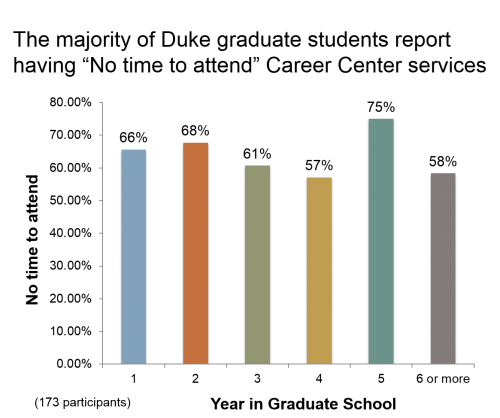
Blog
No time to be an Emerging Leader?

How was I going to convince my mentor that spending 25+ hours on my professional development would be a good idea–especially considering that it would take away from time in the lab? The email from Graduate Student Affairs promised that the opportunity would “develop participants’ leadership, professional adaptability, communication, self-awareness, and interdisciplinary teamwork skills, preparing them to become successful employees after graduation.” But how could I sell that to my mentor, who was likely more concerned about my success prior to graduation? Luckily my mentor saw potential value in the Emerging Leaders Institute (ELI) and supported my decision to participate in the program, which ran during spring 2014.
As part of the program, we were assigned to small interdisciplinary groups and asked to work on an issue that affects career opportunities for graduate students and postdocs. My team decided to focus on awareness, utilization, and efficacy of Duke Career Center resources for graduate students. We developed and implemented a 6-question Qualtrics survey and found that awareness and efficacy ratings of the various Career Center resources are generally high. In addition, we identified that a majority of students, including 75% of fifth-year students, report that they do not use Career Center resources due to lack of time.
We drafted a two-tier set of recommendations which, based on our data, should improve student engagement even further. The first tier involved low-investment procedural changes, such as adding transit information and “add to calendar” links to Career Center emails. The second tier contains long-term, high-investment recommendations, as I’ll describe below.
The major obstacle to Career Center resources identified by our survey was the students’ perception of having a “lack of time.” We acknowledge that this perception will be hard to break, but one possible way is through program and departmental leadership. If program and departmental leadership emphasize the importance of utilizing the Career Center and seeking professional development opportunities early and often to both students and faculty, we might start to see a change in perception. It also follows that if a student’s mentor does not stress career and professional development as an essential part of graduate training, the student will likely undervalue those opportunities. If mentors can get a clear message of the immediate benefits that their students obtain through career and professional development, then support may increase.
I will end here with just a few reasons why participating in ELI was a good investment for both myself and my mentor:
- Having to solve new problems reenergized my creative thinking process.
- Learning strategies to perfect oral presentations as well as the opportunity to practice vastly improved my own research presentations.
- Working in a group setting with a deadline helped me to develop habits to work cohesively and effectively with others.
So I would only change the ELI promise slightly, to instead read that ELI “will develop participants’ leadership, professional adaptability, communication, self-awareness, and interdisciplinary teamwork skills, improving their likelihood of becoming successful graduate students/postdocs and preparing them to become successful employees after graduation.”
Aaron Towers is a fifth-year PhD candidate in Genetics and Genomics, Director of Advocacy for GPSC, and creator of GradConvos.
The other participants in this ELI group were:
- Inder Jalli, Biology, PhD candidate
- Savannah Windham, Secondary Education, MAT candidate
- Shraddha Desai, Medicine-Oncology, postdoctoral associate